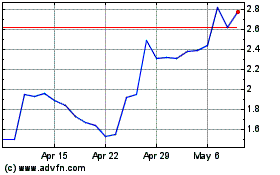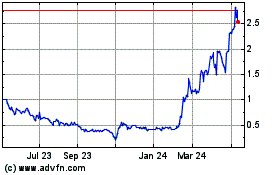Medicenna Therapeutics Corp. (“Medicenna” or the “Company”) (TSX:
MDNA, OTCQX: MDNAF), a clinical-stage immunotherapy company focused
on the development of Superkines, today announced the presentation
of preclinical data on MDNA11, a long-acting “β-enhanced Not-α”
IL-2 Superkine, and bizaxofusp (MDNA55), an IL-4 Empowered
Superkine, at the 2024 Annual Meeting of the Society for
Neuro-Oncology (SNO) held in Houston, Texas from November 21 – 24,
2024. These data provide compelling evidence of their combined
potential to simultaneously enhance immune activation with MDNA11
and weaken the tumor microenvironment (TME) with bizaxofusp, for
the treatment of “cold tumors” such as glioblastoma (GBM).
Clinical results reported earlier this month
have shown that MDNA11 can effectively attack aggressive cancers
such as pancreatic and colon cancers, by boosting the quality and
quantity of cancer fighting immune cells, such as CD8+ T cells and
NK cells, in patients that have failed or do not benefit from
blockbuster immunotherapies.
Bizaxofusp acts by targeted delivery of a potent
toxin to several types of aggressive cancers that express the
interleukin-4 receptor (IL-4R), such as GBM, without harming
healthy cells. In addition, we have now shown that bizaxofusp
weakens the TME, by selectively killing immunosuppressive cells,
such as regulatory T cells (Tregs), which promote cancer cells to
grow, metastasize, evade the immune system, and resist
treatment.
“The data presented at SNO 2024 this weekend and
at SITC earlier this month, highlight the transformative potential
of our pipeline to address the challenges associated with some of
the most aggressive and recalcitrant tumors such as pancreatic,
colon and brain cancer,” said Fahar Merchant, PhD, President and
CEO of Medicenna. “These results are particularly exciting because
they demonstrate, for the first time, the synergistic potential of
combining MDNA11’s ability to reinvigorate the cancer fighting
immune system with bizaxofusp’s capacity to dismantle the
protective tumor microenvironment associated with the most
formidable and devastating cancers such as GBM. Our findings point
to a potential breakthrough in addressing this significant unmet
medical need for 70% of cancers that do not benefit from the
current class of immunotherapies. At Medicenna, we remain committed
and look forward to pushing the boundaries of our superkine
platforms to deliver bold and synergistic approaches to
significantly improve patient outcomes.”
The presentation, titled "Invigorating Effector
Immune Cells With Highly Selective IL-2R Agonists and Potential
Synergy With Tumor Targeting Therapeutics for Treatment of
Glioblastomas", showcased the ability of MDNA11 and bizaxofusp to
target GBM’s immunosuppressive environment and synergize to elicit
robust anti-tumor responses.
MDNA11 is a next-generation IL-2 superkine
designed to selectively stimulate effector immune cells (CD8+ T
cells and NK cells) by enhancing affinity for IL-2Rβ (CD122) while
avoiding IL-2Rα (CD25), which reduces Treg activation and
associated toxicities. Bizaxofusp is designed to target both the
tumor and the TME, by selectively killing IL4R-expressing cancer
cells, immune suppressive myeloid-derived suppressor cells (MDSCs)
and Tregs.
Key findings presented at the conference
include:
MDNA11: A Long-Acting IL-2
Superkine
- Demonstrated significant survival
benefit (p = 0.031) in an aggressive orthotopic GBM model, with
preferential expansion of CD8+ T cells and NK cells.
Bizaxofusp: An IL-4 Empowered Superkine
Designed to Deliver a Toxin Payload
- Selectively kills IL4R-expressing
tumor cells and immunosuppressive MDSCs, while invigorating
anti-tumor immune responses.
- Potently (IC50 = 0.011 nM) and
selectively eliminated Tregs without impacting CD8+ T cells and NK
cells
Combination Therapy
- MDNA11 and bizaxofusp
synergistically enhanced tumor cell killing in patient-derived GBM
tumoroids, offering a novel combination approach for treating
immunologically "cold" tumors.
- Findings suggest the combination
strategy could redefine treatment paradigms for GBM and other
challenging cancers.
A copy of the presentation will be available on
the “Scientific Presentations” page of Medicenna’s website.
About MDNA11
MDNA11 is an intravenously administered,
long-acting ‘beta-enhanced not-alpha’ IL-2 Superkine specifically
engineered to overcome the shortcomings of aldesleukin and other
next generation IL-2 variants by preferentially activating immune
effector cells (CD8+ T and NK cells) responsible for killing cancer
cells, with minimal or no stimulation of immunosuppressive Tregs.
These unique proprietary features of the IL-2 Superkine have been
achieved by incorporating seven specific mutations and genetically
fusing it to a recombinant human albumin scaffold to improve the
pharmacokinetic (PK) profile and pharmacological activity of MDNA11
due to albumin’s natural propensity to accumulate in highly
vascularized sites, in particular tumor and tumor draining lymph
nodes. MDNA11 is currently being evaluated in the Phase 1/2
ABILITY-1 study (NCT05086692) as both monotherapy and in
combination with pembrolizumab.
About Bizaxofusp
Bizaxofusp (formerly known as MDNA55) is
Medicenna’s IL-4 Empowered Superkine that has been studied in 5
clinical trials in over 130 patients, including a Phase 2b trial in
patients with recurrent glioblastoma (rGBM), the most common and
uniformly fatal form of brain cancer. Results from the Phase 2b
study, which were published in the journal Neuro-Oncology®
(Sampson, et al. June 2023), demonstrated that bizaxofusp more than
doubled the median survival in end-stage rGBM patients when
compared to a well-matched external control arm. Medicenna has
obtained agreement from the U.S. FDA on the study design for the
registrational Phase 3 LIGHT™ (Localized
Infusion for the treatment of recurrent
Glioblastoma with High-dose
bizaxofusp Therapy) trial and the Company is
actively pursuing potential partnerships to conduct the LIGHT
trial, and if approved, bizaxofusp’s commercialization in key
global markets. Bizaxofusp has been granted FastTrack and Orphan
Drug status from the FDA and FDA/EMA, respectively.
About Medicenna
Medicenna is a clinical-stage immunotherapy
company focused on developing novel, highly selective versions of
IL-2, IL-4 and IL-13 Superkines and first-in-class Empowered
Superkines. Medicenna’s long-acting IL-2 Superkine, MDNA11, is a
next-generation IL-2 with superior affinity toward CD122 (IL-2
receptor beta) and no CD25 (IL-2 receptor alpha) binding, thereby
preferentially stimulating cancer-killing effector T cells and NK
cells. Medicenna’s IL-4 Empowered Superkine, bizaxofusp (formerly
MDNA55), has been studied in 5 clinical trials enrolling over 130
patients, including a Phase 2b trial for recurrent GBM, the most
common and uniformly fatal form of brain cancer. Bizaxofusp has
obtained FastTrack and Orphan Drug status from the FDA and FDA/EMA,
respectively. Medicenna’s early-stage BiSKITs™
(Bifunctional
SuperKine
ImmunoTherapies) and the T-MASK™
(Targeted Metallo/Protease
Activated
SuperKine) programs are designed
to enhance the ability of Superkines to treat immunologically
“cold” tumors.
For more information, please
visit www.medicenna.com, and follow us on X
and LinkedIn.
Forward-Looking Statements
This news release contains forward-looking
statements within the meaning of applicable securities laws.
Forward-looking statements include, but are not limited to, express
or implied statements regarding the future operations of the
Company, estimates, plans, strategic ambitions, partnership
activities and opportunities, objectives, expectations, opinions,
forecasts, projections, guidance, outlook or other statements that
are not historical facts, such as statements on the Company’s cash
runway and planned expenditures, the clinical performance and
potential, safety profile of MDNA11 and bizaxofusp, as well as
MDNA11’s and bizaxofusp’s treatment potential, the reporting of
additional results, and anticipated corporate milestones. Drug
development and commercialization involve a high degree of risk,
and only a small number of research and development programs result
in commercialization of a product. Results in early-stage clinical
studies may not be indicative of full results or results from later
stage or larger scale clinical studies and do not ensure regulatory
approval. You should not place undue reliance on these statements
or the scientific data presented. Forward-looking statements are
often identified by terms such as “will”, “may”, “should”,
“anticipate”, “expect”, “believe”, “seek”, “potentially” and
similar expressions and are subject to risks and uncertainties.
Forward-looking statements are based on a number of assumptions
believed by the Company to be reasonable at the date of this news
release. Although the Company believes that the expectations
reflected in such forward-looking statements are reasonable, there
can be no assurance that such statements will prove to be accurate.
These statements are subject to certain risks and uncertainties and
may be based on assumptions that could cause actual results and
future events to differ materially from those anticipated or
implied in such statements. Important factors that could cause
actual results to differ materially from the Company’s expectations
include the risks detailed in the latest annual information form of
the Company and in other filings made by the Company with the
applicable securities regulators from time to time in Canada.
The reader is cautioned that assumptions used in
the preparation of any forward-looking information may prove to be
incorrect. Events or circumstances may cause actual results to
differ materially from those predicted, as a result of numerous
known and unknown risks, uncertainties, and other factors, many of
which are beyond the control of the Company. The reader is
cautioned not to place undue reliance on any forward-looking
information. Such information, although considered reasonable by
management, may prove to be incorrect and actual results may differ
materially from those anticipated or implied in forward-looking
statements. Forward-looking statements contained in this news
release are expressly qualified by this cautionary statement. The
forward-looking statements contained in this news release are made
as of the date hereof and except as required by law, we do not
intend and do not assume any obligation to update or revise
publicly any of the included forward-looking statements.
This news release contains hyperlinks to
information that is not deemed to be incorporated by reference in
this news release.
Investor and Company
Contact:
Christina CameronInvestor Relations, Medicenna
Therapeuticsir@medicenna.com(647) 953-0673
Daniel ScarrInvestor Relations & Business
Development, Medicenna Therapeuticsdscarr@medicenna.com(647)
220-4509
Medicenna Therapeutics (TSX:MDNA)
Historical Stock Chart
From Dec 2024 to Jan 2025

Medicenna Therapeutics (TSX:MDNA)
Historical Stock Chart
From Jan 2024 to Jan 2025
